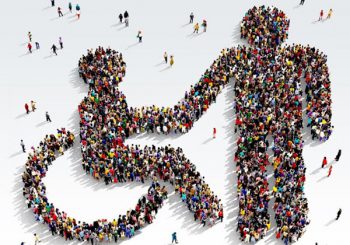Guest Writer for Wake Up World
People in the disabled community are among the most marginalized in American society. Few people recognize the countless accommodations such individuals make each day merely to survive, and they seldom get the assistance they need to truly thrive.
The extra energy it takes to get through the day often leaves little left over to advocate for meaningful changes that could improve the quality of their lives. They need all the help they can get — here’s how to be a true ally to the disabled community.
Recognize Accessibility Needs
The Americans With Disabilities Act (ADA) sets minimum standards for accessibility to all public places. However, buildings constructed before 1991 only need to provide modifications such as wheelchair ramps when “readily achievable.” Unfortunately, the law intentionally leaves that term ambiguous, and as a result, not all buildings are accessible to those who require mobility aids.
Another barrier occurs when people have visual impairments. Such individuals often navigate the world through touch. Including Braille lettering on all signs, especially those giving directions, such as to the nearest restroom, is one solution. Playgrounds can feature brightly colored equipment that helps children with low vision get in on the fun.
One way to be a true ally to the disabled community is to look for public facilities that aren’t in compliance and gently advocate for improvement. Get involved in playground planning committees and request amenities like sensory spaces for children who sometimes get overwhelmed by too much stimulation. If you’re handy with a hammer and see a neighbor struggling with mobility, rally the troops to help build them a ramp.
Be Inclusive
Members of the disability community frequently struggle with loneliness. This feeling isn’t a mere inconvenience — it increases the risk of death from all causes.
Many community members tend to self-isolate, either out of embarrassment or because they don’t want to inconvenience those without disabilities. For example, those who have conditions like rheumatoid arthritis or Crohn’s disease that cause periodic flares might say no to invitations out of fear that they may have to cancel at the last minute if their bodies don’t cooperate.
However, if you don’t understand why your friend or family member engages in such behaviors, you might mistakenly think they don’t want to be included. Often, nothing could be further from the truth. Please keep those invitations coming.
Better yet, go one further and let them know what steps you’ll take to ensure their comfort at social events. For example, you might invest in a toilet riser to make it less cumbersome for those with mobility aids to have a seat. Sometimes, all you have to say is that last-minute cancelations are regrettable, but okay, to put someone’s mind at ease and get them to accept that invitation.
Use Supportive Language
You might think statements such as, “Why don’t you just do X” sound innocuous. However, to someone who has tried everything they know to “get well” to no avail, those words can sound like an accusation: “Your circumstances are all your fault.”
Those in the disability community have a hard enough row to hoe without insinuating that they are somehow responsible for their troubles. Please exercise sensitivity when discussing their conditions and making suggestions. “A friend of mine tried X and had some success,” sounds a lot less accusatory than “why can’t you do X like so-and-so.”
Perhaps the best thing you can do to be a true ally is simply to listen. Many members of the disabled community stay quiet because speaking out about their conditions can have negative consequences. For example, even though the ADA prohibits discrimination in the workplace, many people keep their disabilities hidden because they fear the boss will judge their work differently or they won’t be considered for advancement.
Let them know that they have a safe space with you to openly share their experiences. It also helps if you ask whether they want advice or prefer only to vent.
Advocate
The struggles of many in the disabled community go unrecognized in part for one common-sense reason that has nothing to do with politics — it takes energy to advocate for yourself. Given the increased demands they face to get through the day, they might not have enough left over to speak out for changes that could benefit themselves and others. If you aren’t familiar with Christine Miserandino’s “spoon theory,” it provides an excellent metaphor for understanding the way a chronic illness or disability can impact your daily activities.
Therefore, be a voice for those who struggle to speak out for themselves. Support ideals like extending medical coverage to all Americans. This measure would lift countless working members of the disability community out of poverty — make your preferences known in the voting booth. Write letters to the editor and contact your elected representatives, requesting that they support measures that would improve countless lives.
Be a True Ally to the Disabled Community With These Tips
If you have a friend or loved one with a disability, you might wonder what you can do to help. Become a true ally for the community with these tips.
Also by Kara Reynolds:
- 8 Smart Ways to Teach Children Emotional Regulation
- Why We Should All Care About Black Maternal Health
- 6 Ways We Can Teach Future Generations About Sustainable Living
- How I Eased My Postpartum Anxiety
- 8 Gentle Ways to Slowly Remove Sugar in Your Diet
- How Neurotypical Parents Can Support Neurodivergent Children
About the author:
 Kara Reynolds is the Editor-in-Chief and founder of Momish Magazine. Mom, stepmom, and wife – Kara wants to normalize big blended families. She enjoys pilates, peanut butter, and pinot grigio – but not at the same time.
Kara Reynolds is the Editor-in-Chief and founder of Momish Magazine. Mom, stepmom, and wife – Kara wants to normalize big blended families. She enjoys pilates, peanut butter, and pinot grigio – but not at the same time.

If you've found value in our articles, we invite you to support the release of our brand-new book, "Gratitude Practices for Kids: A Practical Guide for Adults to Instill a Spirit of Appreciation and Positivity in the Next Generation."
"Gratitude Practices for Kids" brings together over 25 innovative and accessible practices designed to enhance gratitude in everyday life. This comprehensive guide is backed by 17 scientific studies, ensuring each concept is grounded in research, underscoring our commitment to nurturing growth, emotional intelligence, and positive interactions between adults and children.
We encourage you to opt for the paperback version to celebrate this new release. Dive into its fresh pages away from digital distractions, allowing you to immerse yourself in the transformative practices it offers.
Over recent years, Wake Up World has faced significant online censorship, which has impacted our financial ability to operate. Moving into book publishing represents a strategic step to secure the ongoing funds needed to continue our mission. By purchasing Gratitude for Kids, you help us keep our content free and accessible to everyone, avoiding needing a paywall. With over 8,500 articles published in the last 13 years, we remain dedicated to keeping our valuable content open to all.








